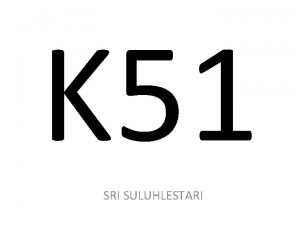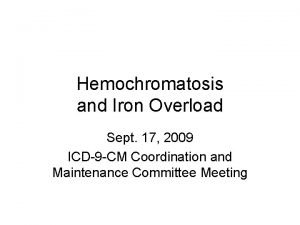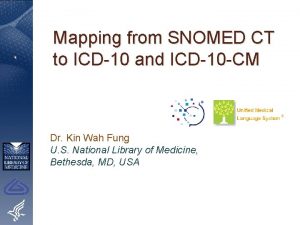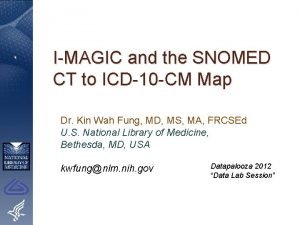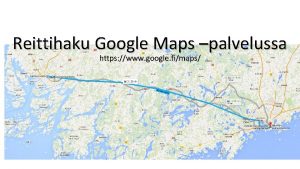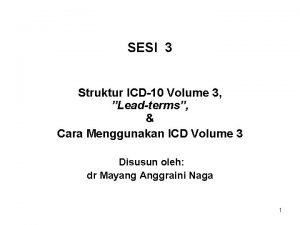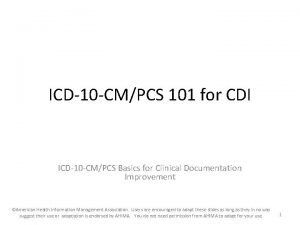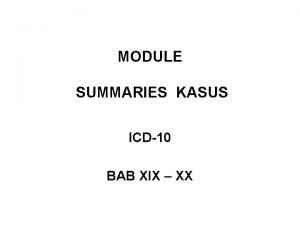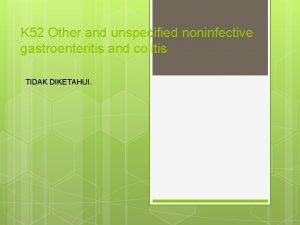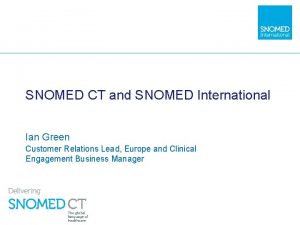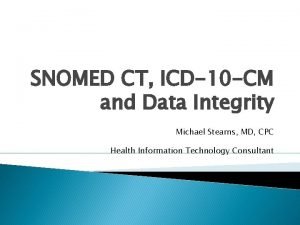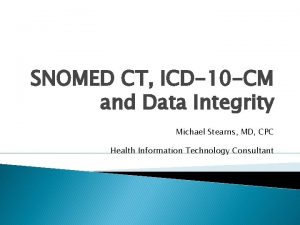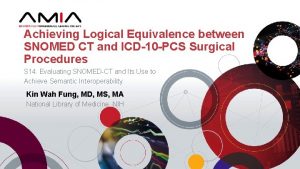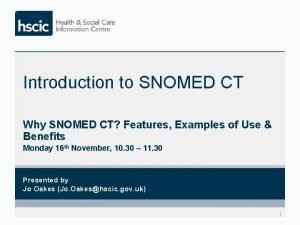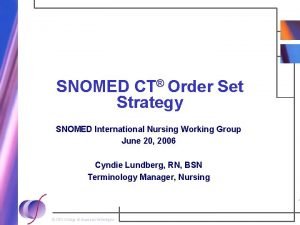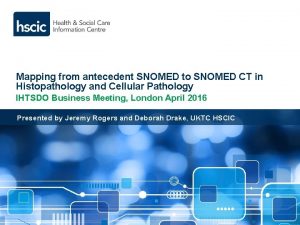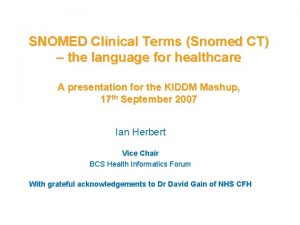SNOMED CT to ICD10 Maps Other and Unspecified
















- Slides: 16

SNOMED CT to ICD-10 Maps Other and Unspecified

Overview ▪ A feature of the ICD-10 classification, that distinguishes it from a terminology like SNOMED CT, is the presence of codes for the ‘other specified’ and ‘unspecified’ form of a disorder ▪ These are usually, but not always. 8 and. 9 (see example D 39), at four character level in a category ▪ The use of these categories means that ICD-10 can be described as ‘exhaustive’ in that every diagnosis can be classified Example D 39

NEC ▪ NEC stands for Not Elsewhere Classified ‘Not Elsewhere Classified’ indicates that specified variants or types of the disease are classified elsewhere, and that where appropriate, a more precise term should be looked for ▪ If the specific diagnostic term cannot be found then the NEC code can be used, indicating that the specific condition does not have a unique code elsewhere in the Classification. In other words, it cannot be coded in another place

Other specified in use D 39. 7 shown below is a grouped code which includes neoplasm of uncertain or unknown behaviour of any specific anatomical area of female genital organs, other than Uterus, Ovary or Placenta. For example fallopian tube, or vulva, would be coded here because they do not have a specific fourth character of their own ▪ The ‘other’ category (. 7 here but usually. 8) is also known as the residual (and sometimes ‘bucket’) category and immediately follows the specific codes/categories to which it pertains.

SNOMED CT to ICD-10 Map Example This slide shows an example of a SNOMED CT concept and its ICD-10 map based on what has been explained previously (see slides 2 and 4) 94837001|Neoplasm of uncertain behavior of female genital organ (disorder)| ICD-10 Index Neoplasm - genital organ or tract - - female NEC D 39. 9 - - - specified site NEC D 39. 7

NEC in the Tabular list ▪ NEC Not Elsewhere Classified ▪ If you see this phrase or its abbreviation used in a code title or in an inclusion or exclusion note, it alerts you to consult the Index or the inclusion and exclusion notes because other conditions which include the same terms are to be found classified elsewhere, often in other chapters of the ICD. ▪ The exclusion notes will help you find alternative codes for various types of oedema. The fourth character categories in R 60. - are only used if you cannot find a more specific code for the case of oedema.

SNOMED CT to ICD-10 Map Example ICD-10 Index Edema, edematous - heat T 67. 7

. 9 in the Index, Volume 3 ▪ A term without any essential modifiers is usually the unspecified form of the condition ▪ When mapping a concept for a diagnosis, problem or reason for an encounter that has no modifiers it is said to be unspecified or unqualified or NOS (not otherwise specified). ▪ NOS (not otherwise specified) is the equivalent of unspecified i. e. usually the. 9. ▪ In the index the code assignment is most often that which directly follows the lead term or the ‘unmodified’ term. The abbreviation NOS is found in the Tabular List not the Index.

SNOMED CT to ICD-10 Map Examples 129103003|Endometriosis (disorder)| 61640006|Endometriosis of cervix (disorder)| - parent Endometriosis of uterus (disorder) ICD-10 Index ▪ Endometriosis N 80. 9 - uterus N 80. 0

Unspecified terms in Volume 1 ▪ Unspecified or NOS indicates where a disease/injury belongs if it is not qualified or if you have no further information to allow you to use a specific three- or four-character code for a disease. Deficiency, deficient - vitamin (multiple) E 56. 9 - - B NEC (complex) E 53. 9 ▪ ‘Vitamin B deficiency, unspecified’ means use E 53. 9 if you do not have any more information other than there is a deficiency of Vitamin B.

193188009 Polyneuropathy due to vitamin B deficiency ▪ In this case, the vitamin is known to be B but is unspecified as no further information is available. Index: Polyneuropathy (peripheral) G 62. 9 -- in (due to) - - lack of vitamin NEC E 56. 9† G 63. 4*

Axis of classification ▪ In ICD-10 anatomy is the primary axis of classification and codes are based on the anatomical systems. BUT ▪ ICD-10 is a variable or multi-axial classification Other examples of axes used are: • Etiology or cause of disease (certain infectious and parasitic diseases) • Type of disease (cardiac arrhythmia) • Morphology or structure and form of an organism (leukaemia) ▪ The use of assorted axes of classification is necessary to meet the needs of a varied groups of users in classifying diseases, injuries and other reasons for health services being provided in a wide array of healthcare settings. ▪ A combination of multiple and varied axes are used in classifying some diseases within the same chapter.

Example types of axis of classification When coding injuries, the first axis of classification is the body region affected (such as head, neck, thorax, etc. ) The second axis of classification of injuries is the specific type of injury (such as superficial, open wound, fracture, dislocation and sprain, injuries to nerves, blood vessels, muscle and tendon damage, crushing injuries, traumatic amputation, other or unspecified injuries, etc. ) ▪ S 50 Example

SNOMED CT to ICD-10 Map Example 211251003|Abrasion, elbow area (disorder)| ICD-10 Index Abrasion — see also Injury, superficial T 14. 0 Injury — see also specified injury type T 14. 9 - superficial (for contusions, see first Contusion) - - elbow S 50. 9

Example of axis of classification ▪ The meaning of ‘other’ (and thus. 8) is determined by the preceding codes/categories to which it pertains as ‘other’. S 60 Superficial injury of wrist and hand S 61 Open wound of wrist and hand S 62 Fracture at wrist and hand level S 63 Dislocation, sprain and strain of joints and ligaments at wrist and hand level S 64 Injury of nerves at wrist and hand level S 65 Injury of blood vessels at wrist and hand level S 66 Injury of muscle and tendon at wrist and hand level S 67 Crushing injury of wrist and hand S 68 Traumatic amputation of wrist and hand S 69 Other and unspecified injuries of wrist and hand S 69. 7 Multiple injuries of wrist and hand S 69. 8 Other specified injuries of wrist and hand S 69. 9 Unspecified injury of wrist and hand

SNOMED CT to ICD-10 Map Example 438480008|Injury of nail bed of finger (disorder)| ICD-10 Index Injury - finger (nail) S 69. 9
 Rectosigmoiditis adalah
Rectosigmoiditis adalah Cll unspecified icd 10
Cll unspecified icd 10 Symbols used to represent unspecified numbers or values
Symbols used to represent unspecified numbers or values Protective reflexes
Protective reflexes Symbols used to represent unspecified numbers or values
Symbols used to represent unspecified numbers or values Seasonal allergy icd10
Seasonal allergy icd10 Snomed to icd 10 mapping
Snomed to icd 10 mapping Snomed ct and icd 10
Snomed ct and icd 10 Google reittihaku
Google reittihaku Icd x luka bakar
Icd x luka bakar Kode icd 10 tuli sensori
Kode icd 10 tuli sensori Icd 10 luka bakar derajat 1
Icd 10 luka bakar derajat 1 Isi volume 3 icd-10 adalah
Isi volume 3 icd-10 adalah Icd-10 for orthopaedics
Icd-10 for orthopaedics Cdi icd10
Cdi icd10 Icd10 sungsang
Icd10 sungsang Isrr icd10
Isrr icd10
